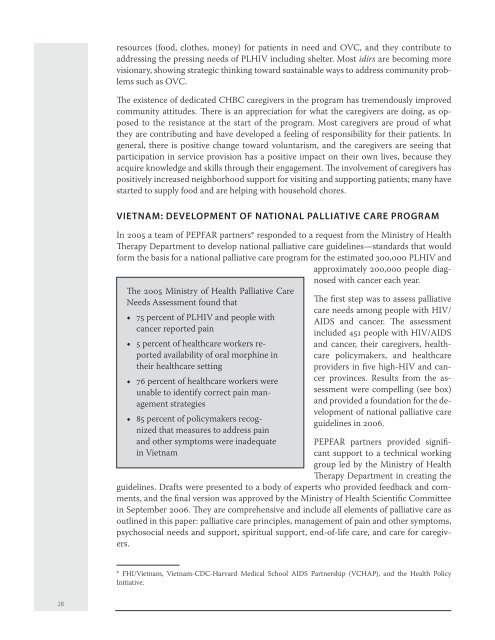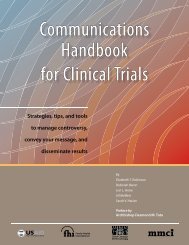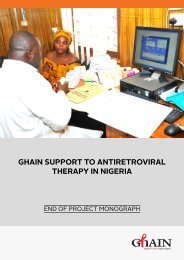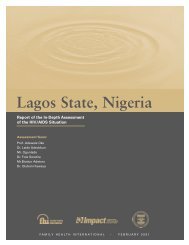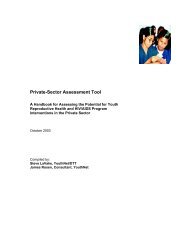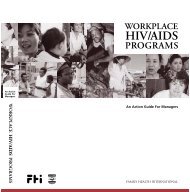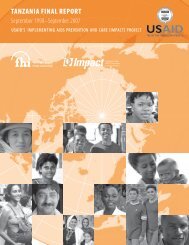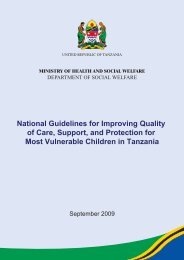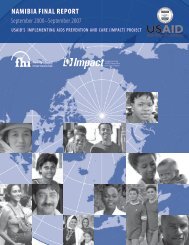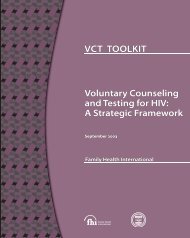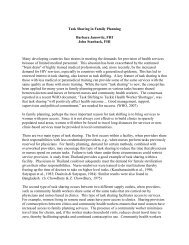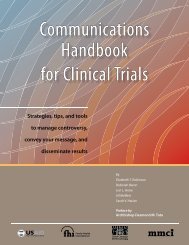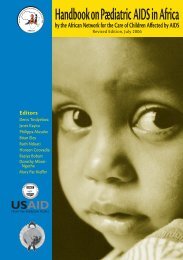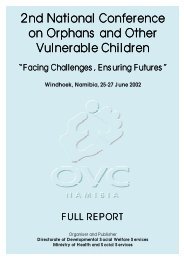Palliative Care Strategy for HIV and other diseases - FHI 360
Palliative Care Strategy for HIV and other diseases - FHI 360
Palliative Care Strategy for HIV and other diseases - FHI 360
Create successful ePaper yourself
Turn your PDF publications into a flip-book with our unique Google optimized e-Paper software.
28<br />
resources (food, clothes, money) <strong>for</strong> patients in need <strong>and</strong> OVC, <strong>and</strong> they contribute to<br />
addressing the pressing needs of PL<strong>HIV</strong> including shelter. Most idirs are becoming more<br />
visionary, showing strategic thinking toward sustainable ways to address community problems<br />
such as OVC.<br />
The existence of dedicated CHBC caregivers in the program has tremendously improved<br />
community attitudes. There is an appreciation <strong>for</strong> what the caregivers are doing, as opposed<br />
to the resistance at the start of the program. Most caregivers are proud of what<br />
they are contributing <strong>and</strong> have developed a feeling of responsibility <strong>for</strong> their patients. In<br />
general, there is positive change toward voluntarism, <strong>and</strong> the caregivers are seeing that<br />
participation in service provision has a positive impact on their own lives, because they<br />
acquire knowledge <strong>and</strong> skills through their engagement. The involvement of caregivers has<br />
positively increased neighborhood support <strong>for</strong> visiting <strong>and</strong> supporting patients; many have<br />
started to supply food <strong>and</strong> are helping with household chores.<br />
vietnam: development oF national palliative <strong>Care</strong> program<br />
In 2005 a team of PEPFAR partners* responded to a request from the Ministry of Health<br />
Therapy Department to develop national palliative care guidelines—st<strong>and</strong>ards that would<br />
<strong>for</strong>m the basis <strong>for</strong> a national palliative care program <strong>for</strong> the estimated 300,000 PL<strong>HIV</strong> <strong>and</strong><br />
approximately 200,000 people diag-<br />
The 2005 Ministry of Health <strong>Palliative</strong> <strong>Care</strong><br />
Needs Assessment found that<br />
• 75 percent of PL<strong>HIV</strong> <strong>and</strong> people with<br />
cancer reported pain<br />
• 5 percent of healthcare workers reported<br />
availability of oral morphine in<br />
their healthcare setting<br />
• 76 percent of healthcare workers were<br />
unable to identify correct pain management<br />
strategies<br />
• 85 percent of policymakers recognized<br />
that measures to address pain<br />
<strong>and</strong> <strong>other</strong> symptoms were inadequate<br />
in Vietnam<br />
nosed with cancer each year.<br />
The first step was to assess palliative<br />
care needs among people with <strong>HIV</strong>/<br />
AIDS <strong>and</strong> cancer. The assessment<br />
included 451 people with <strong>HIV</strong>/AIDS<br />
<strong>and</strong> cancer, their caregivers, healthcare<br />
policymakers, <strong>and</strong> healthcare<br />
providers in five high-<strong>HIV</strong> <strong>and</strong> cancer<br />
provinces. Results from the assessment<br />
were compelling (see box)<br />
<strong>and</strong> provided a foundation <strong>for</strong> the development<br />
of national palliative care<br />
guidelines in 2006.<br />
PEPFAR partners provided significant<br />
support to a technical working<br />
group led by the Ministry of Health<br />
Therapy Department in creating the<br />
guidelines. Drafts were presented to a body of experts who provided feedback <strong>and</strong> comments,<br />
<strong>and</strong> the final version was approved by the Ministry of Health Scientific Committee<br />
in September 2006. They are comprehensive <strong>and</strong> include all elements of palliative care as<br />
outlined in this paper: palliative care principles, management of pain <strong>and</strong> <strong>other</strong> symptoms,<br />
psychosocial needs <strong>and</strong> support, spiritual support, end-of-life care, <strong>and</strong> care <strong>for</strong> caregivers.<br />
* <strong>FHI</strong>/Vietnam, Vietnam-CDC-Harvard Medical School AIDS Partnership (VCHAP), <strong>and</strong> the Health Policy<br />
Initiative.


